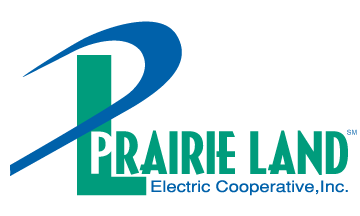The Holcomb Expansion Project. It’s a project that’s been in the news for 15 years and one that has recently come to an official end. Many of you may have followed the project closely over the years; but for others, it may be a project with which you are only vaguely familiar.
So here’s a little history: In the 1970s, Sunflower Electric Power Corporation (the utility that Prairie Land Electric Cooperative, Inc. co-owns to provide us with wholesale generation and transmission services) purchased 10,000 acres of sand sage prairie for the development of Holcomb Station, which currently houses its 349 MW coal-based unit. The land was originally purchased and Holcomb Station was originally designed to support additional generating units if necessary.
The development of the Holcomb Expansion Project began in 2005 when Sunflower and other electric utilities were facing a growing demand for both energy and capacity to serve their electric cooperative consumer-members.
Sunflower and its members, including Prairie Land Electric Cooperative, explored all generation options and determined that adding coal-based units to Holcomb Station was the best solution to provide reliable, affordable, long-term power to their members. Keep in mind that wind energy was then in its infancy and the price of gas was extremely high.
In 2005, Sunflower began partnering with Tri-State Generation and Transmission Association, a cooperatively operated utility headquartered in Colorado, and other electric utilities to determine the best design and ownership options for the expansion of Holcomb Station.
After extensive analysis and work, the Holcomb Expansion Project emerged, and on behalf of all the Project partners, in 2006 Sunflower filed an application with the Kansas Department of Health and Environment (KDHE) for a Prevention of Significant Deterioration (PSD) air permit for three supercritical 700 MW units. A few months later, the air permit application was reduced to two 700 MW units. In 2007, Sunflower and Tri-State entered a Purchase Option and Development Agreement (known as a PODA), which required Sunflower to protect the optionality of the Project as long as Tri-State chose to pursue the Project.
For three years, the Project experienced legal challenges, despite the fact that the KDHE staff had recommended that the air permit for the two 700 MW units be approved. After much work at the Statehouse by Sunflower’s staff and members, in May of 2009, Sunflower and the State of Kansas reached a compromise consisting of one 895 MW unit and several environmental initiatives. KDHE approved the PSD air permit for the 895 MW unit in December 2010.
Tri-State would have owned any additional units, and the other Project partners—including Sunflower—would have had purchasing rights to part of the energy output. In addition, Sunflower would have operated and maintained any additional units. Sunflower’s operation and maintenance of the Project would have generated revenue for the benefit of all of its members—including Prairie Land Electric Cooperative—in addition to the Project earning development and rental fees and saving money due to economies of scale. Thus, the Holcomb Expansion Project would have provided many benefits to Sunflower and its members, in addition to the needed energy and capacity.
During the next several years, Sunflower’s generation needs began changing due economic conditions. Although Sunflower no longer needed the energy or capacity from the Project to serve its members, Sunflower honored the development responsibilities it had contracted with Tri-State and continued to preserve the Project’s air permit as necessary.
Each air permit has an 18-month timeframe during which the Project must commence construction or the air permit expires. From 2010 thru 2018, legal battles and various proposed federal environmental regulations resulted in Sunflower filing for and being granted two extensions to the PSD air permit, the second of which will expire on March 27, 2020.
Tri-State recently announced that it no longer has a need to develop the Project. As a result, Sunflower will allow the PSD air permit to expire, signifying the official end of The Holcomb Expansion Project.
During the last 15 years, Sunflower received development fees from its Project partners. that allowed Sunflower to deliver wholesale electricity to its member cooperatives at a cost otherwise not possible. That’s always good news for cooperative members.
As in the past, Sunflower and its members will continue to consider all generation resources when responding to changing energy demands. Rest assured that all projects are analyzed at each phase and only move forward when the project remains in the best interest of cooperative ratepayers at the end of the line. Although solutions to challenges may change, your cooperative’s commitment to you will not.
- About Us
- Your Membership
- Rates and Billing
- Communication
- For the Community
- Safety
- Staying Prepared: Energy Emergency Alerts Explained
- Safety Resources
- Safety Quiz
- Avoiding Utility Scams
- High Voltage Safety Demonstrations
- Power Outage FAQ
- Power Outage Tips
- Electrical Safety for First Responders
- Understanding Step Potential
- Utility Pole Considerations
- Generator Safety - Our Lives Are on the Line
- Energy Efficiency
- Renewable Energy
